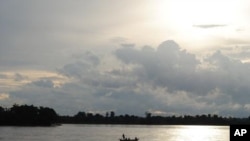[Editor’s Note: The Mekong River Commission, or MRC, whose members include Cambodia, Laos, Thailand, and Vietnam, is holding its annual meeting in Preah Sihanouk through Saturday, to debate whether to allow a proposed dam in Xayaburi province, Laos. Opponents say the dam could be damaging to the ecology of the river and the livelihoods of the people who rely on it. Cambodia has yet to determine its support for the dam, Sin Niny, vice chairman of Cambodia’s National Mekong Committee, told VOA Khmer in an interview at the outset of the meeting.]
Why is the decision on whether to build the Xayaburi dam so important, especially for Cambodia?
The Xayaburi plan by Laos relates to the 1995 Mekong Agreement, in which Article 5 requires that any usage of the water in the [Mekong] mainstream requires prior consultation or agreement between member countries. Laos’ Xayaburi dam is a mainstream dam and there is, thus, a requirement of consent from [other] member countries.
What has been done so far as part of this consultation requirement?
Currently, in accordance with the 1995 Mekong Agreement as well as procedures on water usage, MRC member countries are consulting with one another on the Xayaburi dam project, which was proposed by Laos. In each member country, forums are held to invite stakeholders to participate, including ministry representatives, government experts, NGOs and civil society, and local communities, to discuss the issue. In Cambodia, two forums were held in February.
In those forums, what were the suggestions of civil society and local communities?
It’s their right to say whatever they want about this dam project. They were not required to agree with the dam project. But when I attended the Kampong Som [Preah Sihanouk] forum, civil society and NGOs said that they were not against the development plan, but their position is to take part in the debate so as to ensure that there are not too many negative impacts to our economy and people, to make sure that the plan would mitigate the negative impacts to an acceptable degree. This was their common position.
What concerns have Cambodian participants raised?
The participants raised a number of concerns, which the Cambodian National Mekong Committee submitted to the MRC Secretariat to further forward to the Lao side. We have requested that Laos study those concerns more thoroughly.
What were those concerns?
Firstly and most importantly, the documents [of the Xayaburi Environmental Impact Assessment by Laos] were sent late and there was not enough time to study them.
Secondly, the mitigation of impacts on fisheries as analyzed in the study is not clear. How can the dam be designed to allow fish to pass through? The dam plan includes a fish passage, but the participants in the forum think that there are more than one species of fish, and the variety of fish species have different migration patterns.
The third major concern relates to natural disasters that can occur at the dam site. For example, in the case of an earthquake at the dam site, have those who studied the project planned for this? The forum requested that the issue be studied more thoroughly—because now climate change is becoming more severe and most recently people are concerned about earthquakes in Japan. It has been observed that there have been earthquakes at the Xayaburi site as recently as 2011.
Fourthly, the project would not only impact fish, but also affect agriculture. The silt carried downriver by the Mekong would be blocked by the dam.
The fifth concern is the impact on the more than one million people downriver from the dam, whose livelihood is directly dependent on the resources of the Mekong River. Without proper consideration, the project could severely threaten their livelihood.
What has been Cambodia’s position on the Xayaburi dam so far?
I want to make it clear that it is impossible [at this point] for us to have a clear position—whether or not to agree on the construction. We have to wait for the results of the study. If the results of the study show that the impacts are acceptable, we should allow the construction to go ahead. If the impacts in the study remain unclear or are too severe to mitigate, we have to discuss our position further within the Cambodian government circle, in greater depth. In the case that the impacts cannot be mitigated, the Cambodian National Mekong Committee will report to the Cambodian government and request their guidance.
What can be expected from this week’s MRC meeting in Preah Sihanouk?
According to MRC procedures, there is a six-month consultation period after [MRC] is notified of the project by the proposing country. The final decision on the Xayaburi is not due until April 22. But the Joint Committee meeting in Sihanoukville will also discuss this issue. Procedurally, if relevant parties cannot reach an agreement within the six months, the ‘prior consultation’ can be extended. In the consultation in Sihanoukville on the 24th, 25th and 26th, the concerns of Vietnam and Thailand will similarly be unaddressed by Laos, because there is not enough time. So I believe, the meeting will discuss those concerns. I don’t know what will be decided in the meeting, but my guess is that the prior consultation will be extended.




